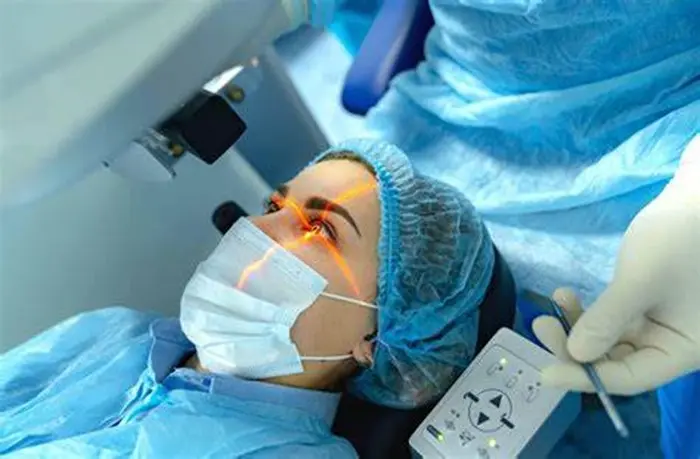Laser eye surgery, particularly LASIK (Laser-Assisted in Situ Keratomileusis), is a popular procedure for correcting vision problems such as myopia, hyperopia, and astigmatism. As more people consider this option, a common question arises: “What age can you get laser eye surgery?” This article will explore the factors determining the appropriate age for laser eye surgery, the benefits and risks involved, and the considerations for different age groups.
Understanding Laser Eye Surgery
What is Laser Eye Surgery?
Laser eye surgery involves reshaping the cornea, the clear front part of the eye, to improve vision. The most common types of laser eye surgery include:
LASIK (Laser-Assisted in Situ Keratomileusis): A flap is created in the cornea, and the underlying tissue is reshaped.
PRK (Photorefractive Keratectomy): The outer layer of the cornea is removed, and the underlying tissue is reshaped.
LASEK (Laser Epithelial Keratomileusis): Similar to PRK, but involves preserving the outer layer of the cornea.
Age Considerations for Laser Eye Surgery
Minimum Age Requirement
The minimum age for laser eye surgery is typically 18 years old. This is because the eyes are still developing and changing during childhood and adolescence. Performing surgery before the eyes have fully matured can lead to unpredictable results and the need for further corrective procedures.
Why Wait Until 18?
Stability of Vision: By the age of 18, most people’s vision has stabilized. Before this age, the eyes may still be undergoing changes, and performing surgery on a developing eye can result in the need for additional surgeries.
Legal Considerations: Patients under 18 are considered minors and require parental consent for medical procedures. Waiting until the patient is an adult ensures they can provide informed consent.
Ideal Age Range for Laser Eye Surgery
Young Adults (18-24)
Vision Stability: Vision typically stabilizes by age 18, but it is recommended to wait until the mid-20s to ensure stability.
Career Considerations: Many young adults consider laser eye surgery before starting careers that require good vision, such as in the military or aviation.
Adults (25-40)
Optimal Candidates: Most patients in this age range are ideal candidates for laser eye surgery. Vision is stable, and the cornea is healthy.
Long-Term Benefits: Undergoing surgery at this age provides long-term benefits, as the corrected vision can last for decades.
Middle-Aged Adults (40-60)
Presbyopia Onset: Around the age of 40, presbyopia, the age-related difficulty in seeing close objects, begins to develop. This condition may require reading glasses even after laser eye surgery.
Eligibility: Patients in this age range can still be good candidates for laser eye surgery, but they should be aware of the potential need for reading glasses.
Older Adults and Laser Eye Surgery
Over 60
Age-Related Eye Conditions: Older adults are more likely to develop age-related eye conditions such as cataracts, glaucoma, and macular degeneration.
Laser Eye Surgery vs. Cataract Surgery: In some cases, cataract surgery, which also corrects vision, may be a better option for older adults.
Factors Influencing the Appropriate Age
Eye Health
Corneal Thickness: Adequate corneal thickness is necessary for laser eye surgery. A thin cornea can increase the risk of complications.
Eye Conditions: Pre-existing eye conditions such as dry eye syndrome or keratoconus can affect eligibility for surgery.
Overall Health
Systemic Health Conditions: Conditions like diabetes or autoimmune diseases can affect healing and the success of the surgery.
Medications: Certain medications can affect the eyes and the healing process post-surgery.
Risks and Benefits of Laser Eye Surgery
Benefits
Improved Vision: Most patients achieve 20/20 vision or better.
Reduced Dependence on Glasses/Contacts: Many patients no longer need glasses or contact lenses.
Quick Recovery: Most patients recover quickly, with significant improvement in vision within a few days.
Risks
Dry Eyes: Temporary or permanent dry eye syndrome can occur.
Flap Complications: Issues with the corneal flap created during LASIK can arise.
Vision Changes: Some patients may experience glare, halos, or double vision.
Preparing for Laser Eye Surgery
Consultation
Comprehensive Eye Exam: A thorough eye exam is necessary to determine eligibility and plan the procedure.
Discuss Expectations: Understanding the realistic outcomes and limitations of the surgery is crucial.
Pre-Surgery Guidelines
Stop Wearing Contact Lenses: Patients are usually advised to stop wearing contact lenses several weeks before the surgery to allow the cornea to return to its natural shape.
Avoid Makeup and Lotions: On the day of surgery, avoid wearing makeup, lotions, or perfumes to reduce the risk of infection.
Post-Surgery Care
Immediate Aftercare
Follow Instructions: Adhering to the surgeon’s post-operative instructions is vital for successful healing.
Use Prescribed Medications: Use prescribed eye drops and medications to prevent infection and reduce inflammation.
Long-Term Care
Regular Eye Exams: Continue to have regular eye exams to monitor the health of your eyes.
Protect Your Eyes: Wear sunglasses to protect your eyes from UV rays and avoid rubbing your eyes.
Conclusion
Determining the appropriate age for laser eye surgery involves considering various factors, including the stability of vision, overall eye health, and the presence of any age-related eye conditions. While the minimum age for laser eye surgery is typically 18, the ideal age range extends into the 40s, with each age group having specific considerations. Understanding the risks and benefits, preparing adequately, and following post-surgery care guidelines are essential for achieving the best possible outcome. Laser eye surgery can significantly improve vision and quality of life for the right candidates, making it a valuable option for those seeking freedom from glasses and contact lenses.

